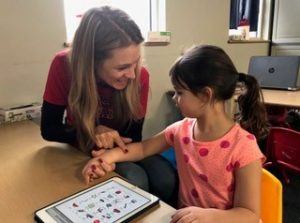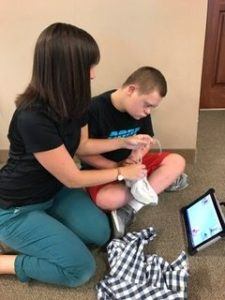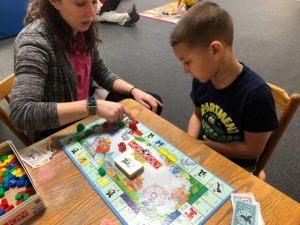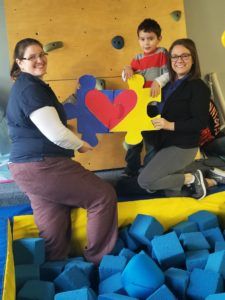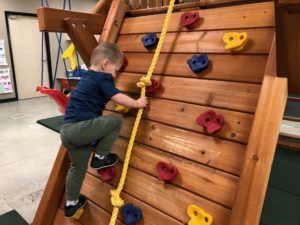therapy
ABC Pediatric Therapy Network is always about progress! If you are receiving services somewhere other than ABC Pediatric Therapy Network and your child is achieving success, DO NOT change a thing. That is what ABC is all about …. SUCCESS! We want your child to be consistently showing progress. We, like you, want your child to reach their maximum potential.
View this post on Instagram
Testimonial Tuesday! Tell us something great about your child’s therapist!

If your child is not achieving success….at school, home therapy, outpatient therapy…. ask more questions. Ask what the goals are and why your child is not achieving them. Maybe modify the goals or the strategies to achieve them. Is your team on board to create change that is responsive to your child’s needs?! Let’s hope so!
Perhaps now is time for a change.
If you are receiving therapy at school, call an IEP meeting to discuss strategies. You might be able to increase the minutes your child is seen. Maybe you just need to modify the approach to the goal. You could change the location where the goal is being worked on – if in the classroom, try a private room. Maybe your child is being seen in a group and one on one would be better. Perhaps the stairs in the school are not motivating but the stairs to the playground are.
Add additional outpatient therapy to increase the intensity to reach goals. Having another perspective from another therapist can be beneficial. Private therapy is usually individual and this increased intensity might be just what your child needs.
Is summer approaching? What is your plan to push potential during the summer?
Are you at an outpatient facility and your child needs a change? Each outpatient therapy office has a different approach to treatment. Take a tour at another facility to see what best meets your child’s needs.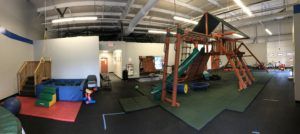
Therapy…success…change…progress – is all about communication. Your therapy team needs to listen to your and your child’s wants/ needs and modify the plan of care constantly to be responsive to you and your child. If you have found that…great! Celebrate the small victories and push for the big wins! If you have not found that, do not stop advocating for your child. You are often their voice as well as their cheerleader!
*Find the therapy approach – outpatient, school, one on one or group – that succeeds in ensuring your child progresses.
*Increase communication – update or change goals to accomplish more developmental milestones.
*Increase frequency – attend therapy more often or add outpatient to school therapy.
Whatever you do, do not stop trying something new or something different than what you are doing now until you see the progress you want for your child.
You know your child best. Achieving developmental milestones increases self esteem in your child. Feeling like you can do the same tasks as your friends creates a sense of acceptance and achievement.
Empower and educate yourself at www.abcpediatrictherapy.com. Reach out to ABC if we can help you in any way!
Read MoreAre you having trouble motivating your child to practice their speech and language skills at home? Your child’s speech therapist is likely assigning tasks to practice at home throughout the week to reinforce the skills they’re learning in therapy. Home practice can make a huge difference in their progress and usually means faster improvement. Speech therapy isn’t an easy fix and it requires a lot of hard work and consistent practice over many months or even years. Home practice does not have to be boring! Below is a list of applications, websites, and games that you can utilize to make home practice fun:
- Applications

o My PlayHome
- Compatibility: iPhone, iPad, and iPod touch
- Price: $3.99
- Description: My PlayHome is an interactive doll house game that contains a variety of male and female characters that can eat, drink, cook, shower, sleep, and so much more. Your child can explore every room in the house while enjoying the colorful and detailed illustrations.
- How to use it:
- Expressive language skills: Labeling actions and common objects, producing regular and irregular past tense verbs, answering wh- questions, describing picture scenes, telling how common objects are used, naming categories, producing he/she pronouns and regular plural -s.
- Receptive language skills: Identifying common items, understanding verbs in context, understanding use of common objects, following directions, and understanding pronouns.
- Why it works: My patients absolutely love this game. It is so fun and motivating- they don’t even realize they are working on a variety of language skills!
o Articulation Station
- Compatibility: iPhone, iPad, and iPod touch
- Price: Lite version is free, individual sounds range from $3.99 to $7.99, and full version is $59.99
- Description: The application includes 22 different sounds and 6 engaging articulation activities to help your child speak and pronounce their sounds more clearly.
- How to use it: Select the individual sound(s) your child is working on in speech therapy and practice at the word, phrase, sentence, or story level.
- Why it works: The application is fun, colorful, and engaging. You can practice your child’s sounds through flashcards, matching games, rotating sentences, unique sentences, and stories. The activities are so fun that my patients often forget they are “working” on their articulation skills.
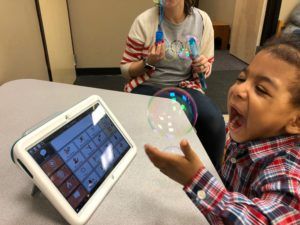
- Websites
o Home Speech Home
- Link: https://www.home-speech-home.com/
- Description: Home Speech Home is a website created by two certified speech-language pathologists. This website offers a variety of activities and word lists to practice articulation, apraxia, language, and stuttering principles. In addition, speech and language developmental norms and an overview of various speech and language disorders are also included.
- How to use it: I frequently utilize the word lists feature with my older patients. I select the specific sound(s) that my patient is working on and incorporate the words while playing their favorite board game or within conversation. You can practice their articulation skills at home with premade words, phrases, sentences, and stories.
o Mommy Speech Therapy
- Link: http://mommyspeechtherapy.com/
- Description: Mommy Speech Therapy is a website created by a certified speech-language pathologist. This website offers a variety of free articulation worksheets that include colorful pictures of your child’s specific target words, as well as helpful tips and tricks on how to increase your child’s speech and language skills at home.
- How to use it: You can select your child’s specific sound(s) and print out the associated free articulation pictures, cut them into individual pictures, and play a variety of games at home. You can hide the pictures around the house and have a “scavenger hunt” and ask your child to name the pictures when they find them. You can print out an extra page and play Go Fish or a matching game with the pictures while reinforcing their articulation skills. The options are limitless!
- Games

o Guess Who
- How to play: You can target a variety of language and articulation skills with this classic board game. Guess Who is great for working on he/she pronouns, asking questions, answering yes/no questions, producing grammatical forms (e.g. do/does, has/have), and articulation skills at the conversational level.
o Hedbanz
- How to play: Hedbanz is a fun way to work on naming categories, answering yes/no questions, turn taking, and articulation skills while your child guesses the identity of the card they’ve been dealt.
o Simon Says
- How to play: Simon Says is a quick and easy game to work on identifying common objects (e.g. body parts), following one-step directions, as well as directions of increasing length and complexity.
If you have questions about your child’s speech and language skills please contact ABC Pediatric Therapy Network at https://www.abcpediatrictherapy.com.
Read MoreBreaking Through The Financial Barriers
ABC is passionate about making sure that finances are not a barrier for your child to receive the services that they need and deserve.
What does ABC do to make understanding insurance benefits easy?
An ABC staff member will call your insurance company to determine your benefits.
We also ask that you also call your insurance company to hear your benefits as well.
We will share with you what we learn about your benefits. Helping you understand your financial responsibility is important to us.
What insurance companies is ABC in network with?
ABC is in network with nearly every insurance company.
Once I understand my benefits, what do I do if I can’t afford therapy or find that therapy is not covered?
 ABC has helped hundreds of families find alternative funding to help pay for therapy. Please call or email us and we are happy to help you too.
ABC has helped hundreds of families find alternative funding to help pay for therapy. Please call or email us and we are happy to help you too.
What if I run out of visits?
If your policy allows more visits to be authorized, ABC will handle requesting additional visits for you or give you the information that is needed to request additional visits if that is what is required by your insurance company.
What if my policy does not allow more visits to be approved?
ABC will work with you to explore alternative funding sources to help pay for more visits.
We also offer private pay and sale appointments to ensure you can continue to watch your child be the best them they can be.
 At ABC, HELP does not just occur in our treatment sessions. We HELP to make scheduling and billing easier as well.
At ABC, HELP does not just occur in our treatment sessions. We HELP to make scheduling and billing easier as well.
Please visit https://www.abcpediatrictherapy.com to answer more questions you might have. We want to help you!
Read MoreEvaluation Step 1: At your first appointment at ABC Pediatric Therapy, you will first meet your therapist in the waiting room. The therapist will bring you back into a small room or an area in the gym to begin your evaluation. Your evaluation will begin with your therapist asking you a few questions about your child such as his/her medical history, birth history, allergies and more.
Most importantly, your therapist will ask you the following question: What are your concerns and goals for your child to achieve by attending physical, occupational, or speech therapy? 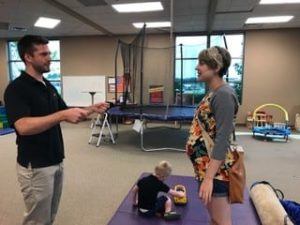
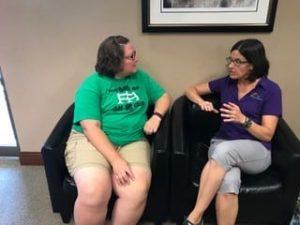
Evaluation Step 2: After providing information about your child, the therapist will assess your child’s strengths and weakness by asking him/her to perform a series of tasks. After assessing your child’s skills, the therapist will determine if your child needs therapy services or if he/she is on track with his/her milestone achievements. If therapy is needed, it will be recommended. For example, your child may be recommended to attend therapy one time per week for a 60-minute session. 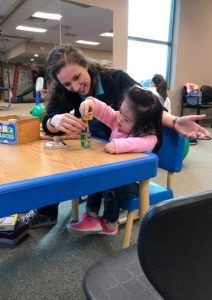
Designing Goals: After a need for therapy is determined, the therapist will write goals to work towards in each therapy session. As a parent, your goals for your child should be reflected in the therapist’s goals for intervention!
Treatment: Treatment begins day one! Treatment may take place in the large gym or a small room depending on the goal targeted and your child’s needs. The therapist will begin to work with your child to improve his/her skills and work toward meeting the goals set. Therapists love having you involved in each treatment session. This is how you learn more about how to help your child. Treatment sessions will continue until your child meets his/her goals set by you and your therapist. The more consistent you are with attending your scheduled appointments, the faster progress will be made. Goals will be updated and changed to challenge your child to progress his/her gross motor, fine motor, or speech skills.
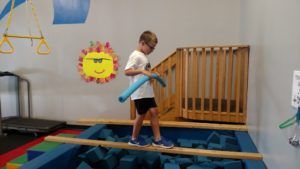
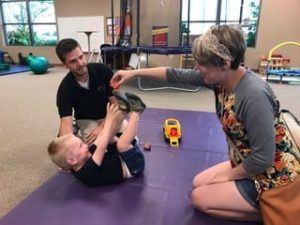
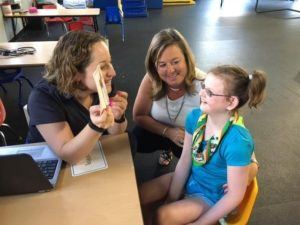
Home Exercise Program: Beginning on your first day, your therapist will provide you with exercises or activities to perform at home for practice. Your therapist will provide guidance on how to practice the tasks to help your child be successful. Ask your therapist for tips on how to practice while keeping up with your busy, daily schedule! Your home exercise program will be updated as your child progresses through therapy.
Discharge: After your child has met the goals set and your child has overcome your concerns, your therapist will recommend discontinuing therapy services. As the parent or guardian, you will be provided with a home program to continue to practice at home. Your therapist will call you periodically to check in. If concerns arise after discharge, you can call back to meet with your therapist. Your therapist is here to help create the best life for all children!


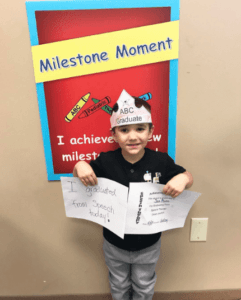
Read More
 Skip to content
Skip to content

